Harvey Milk Reimagined
Stewart Wallace (Composer); Michael Korie (Librettist)
Opera Parallèle
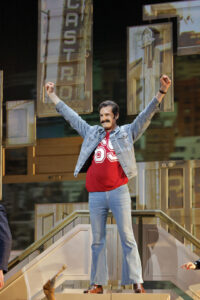
“And shame to rage,
And rage to pride,
And pride to hope,
And hope will never be silent.”
At the age of forty-eight and just days before his assassination, the first out gay elected city official in California reflects his own life’s journey in a climatic moment of Stewart Wallace (composer) and Michael Korie’s stunning, powerful, and deeply moving Harvey Milk Reimagined. Originally premiering in 1995 in Houston and staged by co-commissioning San Francisco Opera in 1996, Harvey Milk was dramatically revised by Opera Parallèle for a 2020 premiere that was COVID cancelled.
Now in the year that would have been Harvey’s 95th birthday, Wallace and Korie’s Harvey Milk Reimagined finally opens in an Opera Parallèle production at the Blue Shield of California Theatre that is not only an incredible tribute to this giant of LGBTQ+ and to San Francisco history but is also particularly timely. Now as much — and maybe even more — as in 1978, we must remember Harvey’s words that “hope will never be silent” as once again LGBTQ+ rights are under attack. The opera’s repeated “Out of the closets, into the streets” is a clarion reminder and a renewed call to action.
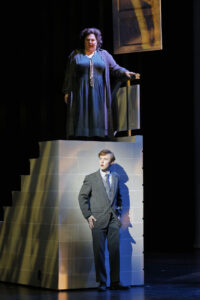
From its opening to its final notes, the opera never lets us forget what Harvey Milk never forgets and what time and again spurs him to his next stage toward activism: his own Jewish roots. A chorus’ haunting chants of the Jewish mourner’s prayer, the Kaddish, open and close the opera. A mother’s memories of the horrors of the Holocaust are embedded in a Young Harvey as Catherine Cook sings in an emotionally trembling and beautiful mezzo-soprano, “Never forget who you are … Remember, never again.”
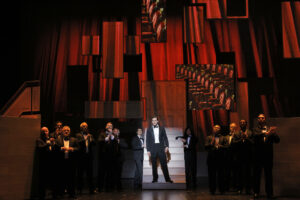
But beyond his Jewish heritage, Young Harvey must also search for who he really is in other respects. His early love of opera sends him to the Met where he sees men sitting together, joyously singing “Bravo, bravissimo” while shedding tears openly. Young Harvey (Curtis Resnick) sings in an innocent, searching tenor voice, “Who are these men?” and “Where do they go when the opera’s over?”
Scenes of Young Harvey following them into a park where cruising and hook-ups occur in shadows leads him to new discoveries as well as his first encounter with homophobia and his own arrest by an undercover cop — one in the body of Dan White as Christopher Oglesby introduces us to his arresting tenor with a piercingly sung, “Faggot!” But an angel-like Messenger (Matheus Coura) — one who will be an inner guide for Harvey until his dying moments as he (like his ancestors) crosses his own deserts — sings in gorgeously intoned counter-tenor, “I will guide you on your way, to the place I have promised.”
Harvey’s years as a Wall Street-er in the closet become a scene of a New York apartment where a walk-in closet full of drag outfits and lovers soon lead a now 39-year-old Harvey to confront that in the closet, there is “no view,” “no ventilation.” He also begins to understand that being in the closet is maybe not that different from a German lover who claims that during the war as those with yellow stars passed by, “I saw but I did not see.”
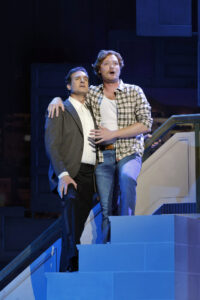
One lover from that closet emerges to become the man that Harvey not only will soon openly love but will also be key to Harvey’s taking that final step out of the closet and into activism. With a tenor voice that rings with clarity and sureness, Henry Benson sings Scott Smith’s challenge to Harvey, “What have you got, Harvey Milquetoast, without the right to walk down the street and be who you are?”
With a baritone voice full and increasingly radiant and confident, Michael Kelley as the adult Harvey sings, “I stand up for myself as a Jew … Why not for as a man who loves men?” With memories still of Jews waiting with their luggage to board trains to their deaths (while also singing in heart-breaking hushed tones the “Who will live, who will die” prayer from Yom Kippur services), Harvey proclaims, “My start is a pair of triangles, one pink, one yellow … They overlap as I do.”
With a resolve that will sends him to the promised land of San Francisco and into an eventual role inspiring millions, Harvey sings “I am just one person but I have hope … I remember who I am.”
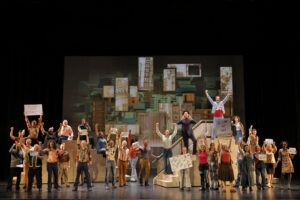
As the opera progresses through the parts of Milk’s life that for most people are much more familiar, scenes of political campaigns and rallies, losses and victories, coalitions and opponents play out before us as so creatively and compellingly directed by Brian Staufenbiel. A twenty-plus Chorus takes on a host of roles from Holocaust victims to rallying gay rights activists, vote-seeking supporters of the Harvey Milk Train, mourning candle-bearing marchers, and much more — all the while singing magnificently under the direction of Jaco Wong in the many styles Stephen Wallace’s breathtaking score demands. Nicole Paiement conducts the challenging, captivating underlying score as played both with vigorous attack and soul-searching reverence by the orchestra of thirty.
Jacqueline Scott’s set design features an array of closed doors and boarded windows hanging like a giant collage — closets waiting for Harvey’s own opening as well as his later call to all, “Come out, come out.” Sets of roaming staircases become stoops in Young Harvey’s boyhood neighborhood, the grand stairs of the Met, the hills of San Francisco, and the steps of SF’s City Hall. Mextly Couzin’s lighting brings to bear time and again the shadows of park cruises and closeted living as well as the excitement of massive rallies, marches, and campaigns. The decades of Harvey’s heritage and of his life become biographical pages made complete by the incredible range of costumes designed by Alina Bokovikova and of hair/make-up designed by Y. Sharon Peng. Projections created by David Murakami add the context of actual footages of Harvey himself and of the times around him as well as abstract backgrounds that enhance emotional reactions to music, events, and turning points.
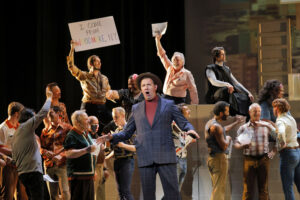
Besides the passionate and powerful ongoing presence of his lover, Scott Smith who continues to remind Harvey “Remember to keep fighting for the ones who came before us,” Wallace and Korie afford us telling and important glimpses of other key figures in Harvey’s life and career. A Teamster (Matt Boehler) and Henrietta Wong (Chea Kang) represent two of several strategic bridges that Harvey cleverly and strategically builds between the heretofore oft-shunned gay community and beer truckers seeking support to boycott Coors (a beer subsequently removed from all Castro gay bars) and with Asians for Affirmative Action, respectively.
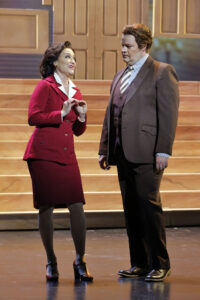
With a rich bass voice ringing with authority, Matt Boehler also is Mayor George Moscone, the close ally of Harvey’s rise and of his all-too-brief, political successes. Commanding clarity of soprano vocals provide Marnie Breckenridge the appropriate vehicle for City Council President Diane Feinstein to voice a politician who tries without success to coach a new member, Dan White, on the “art of schmooze,” something the reclusive member at the table declares he is not at all interested.
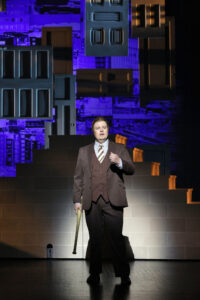
As the life of Harvey Milk unfolds, Steward Wallace never lets us forget from the beginning of Harvey’s awareness of being gay that Dan White’s homophobia is a plague that is building toward a tragic end. With a formidable, exquisitely intoned tenor — the kind of voice operas in general bestow on lovers and heroes and rarely villains — Christopher Oglesby exposes Dan White’s entrenched biases and prejudices as well as his mounting pressures and problems — financial, political, and psychological. We hear a man who bitterly sings that for all his service as a cop, fireman, Vietnam veteran, and now City Council member, the only “thanks” he gets is a can of “beans and franks” for his family’s Thanksgiving dinner. Oglesby is eerily magnificent in the role of a man whose name is now forever engraved in ignominy.
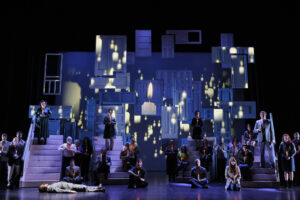
While knowing the end of this story from the moment we enter the auditorium, nothing can quite prepare us for the solemn, sad, yet also hopeful and uplifting Epilogue of the opera. With candle flames aglow, voices rise in the heart-rending, soul-touching Kaddish as we are reminded by Harvey’s close associates and friend, Anne Kronenberg (Gabriella Stoloff-Baéz) that “we there thousands and thousands, gay straight, black and white.” Millions more in the years to follow continued to come out and walk together, becoming an extension of that tragic day’s “midnight sunrise” as a new era of LGBTQ+ activism and demands for full rights carried on Harvey’s legacy.
May Opera Paralléle’s current monumental staging of Steward Wallace and Michael Korie’s Harvey Milk Reimagined serves as our reminder never to forget, always to keep fighting for the this great one named Milk who came before us.
Rating: 5 E, MUST-SEE
A Theatre Eddys Best Bet Production
Harvey Milk Reimagined continues Friday, June 6 at 7:30 p.m. and Saturday, June 7 at 5 p.m. in a two-hour, twenty-minute (with intermission) performance by Opera Parallèlle at the Blue Shield of California Theatre, Yerba Buena Center for the Arts, 700 Howard Street, San Francisco, CA. Tickets are available on line at https://operaparallele.org/, by email at boxoffice@cityboxoffice.com, or by phone at the City Box Office, 415-392-4400.
Photo Credits: Cory Weaver

Leave a Reply